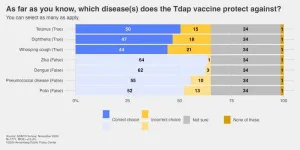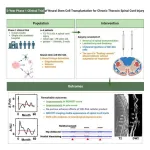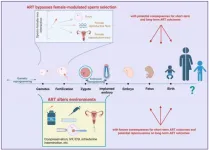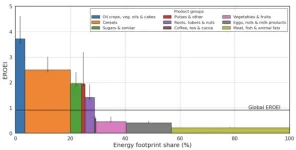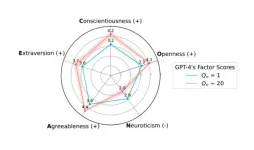(Press-News.org) Image
Adolescent drug use continued to drop in 2024, building on and extending the historically large decreases that occurred during the pandemic onset in 2020.
"I expected adolescent drug use would rebound at least partially after the large declines that took place during the pandemic onset in 2020, which were among the largest ever recorded," said Richard Miech, team lead of the Monitoring the Future study at U-M's Institute for Social Research.
"Many experts in the field had anticipated that drug use would resurge as the pandemic receded and social distancing restrictions were lifted. As it turns out, the declines have not only lasted but have dropped further."
Miech is a principal investigator of the Monitoring the Future Study, which annually surveys eighth, 10th and 12th grade students across the United States.
The number of students who abstained from drug use reached record levels in 2024, with abstention defined as no past 30-day use of alcohol, marijuana or nicotine cigarettes or e-cigarettes.
The percentage of students who abstained from the use of these drugs in 2024 was 67% in 12th grade (compared to 53% in 2017 when it was first measured), 80% in 10th grade (compared to 69% in 2017) and 90% in eighth grade (compared to 87% in 2017). The increases in abstention from 2023 to 2024 were statistically significant in the 12th and 10th grades.
Declines in drug use in 2024 were evident across alcohol, marijuana and nicotine vaping, which are the three most common forms of substance use by adolescents:
For alcohol, significant decreases in 12th and 10th grades continued a long-standing decline that began in the late 1990s. In 2024, 42% of 12th graders reported using alcohol in the past 12 months, a substantial drop from 75% in 1997. Among 10th graders, the percentage fell to 26% from 65% in 1997; among eighth graders, it dropped to 13% from 46% in 1997.
For marijuana, decreases in use among students are a more recent development. In all three grades, the percentage who used marijuana in the past 12 months hovered within a tight window of just a few percentage points in the 20 years from 2000 to 2020. In 2021, the first year surveyed after the pandemic onset, substantial declines in marijuana use took place in all three grades. In 12th and 10th grades, these declines have since continued, and past 12-month use levels in 2024 were the lowest in the past three decades, at 26% and 16%, respectively. In eighth grade, the percentage in 2024 was 7%, the same for the past four years after dropping from a pre-pandemic level of 11% in 2020.
For nicotine vaping, the 2024 declines continue a 180-degree turn centered around the pandemic onset. Before the pandemic, use levels surged from 2017 to 2019 and then held steady in 2020 (before the pandemic onset). Large declines took place during the pandemic, and these declines have since continued to the point where the 2024 levels for the past 12 months of nicotine vaping are close to where they started in 2017, the first year that questions on nicotine vaping were included on the survey. Specifically, past 12-month use was 21% in 12th grade (compared to 35% in 2020 and 19% in 2017), 15% in 10th grade (compared to 31% in 2020 and 16% in 2017) and 10% in eighth grade (compared to 17% in 2020 and 10% in 2017).
The continued declines in adolescent drug use since the pandemic raise important policy and research questions. They suggest that a delay in drug use initiation during adolescence could potentially lower substance use trajectories over a lifetime, Miech says.
Such a delay, he says, may prevent youth from associating with drug-using peer groups that encourage continued use and may forestall biological processes that contribute to the development of addiction.
The Monitoring the Future study is funded by the National Institute on Drug Abuse, one of the National Institutes of Health. It is conducted by researchers at the University of Michigan.
END
Missing rebound: Youth drug use defies expectations, continues historic decline
2024-12-17
ELSE PRESS RELEASES FROM THIS DATE:
Announcing the 2024 Mcknight Brain Research Foundation Innovator Awards in Cognitive Aging and Memory Loss
2024-12-17
NEW YORK CITY and ORLANDO— The American Federation for Aging Research (AFAR) and the McKnight Brain Research Foundation (MBRF) are pleased to announce the 2024 recipients of The McKnight Brain Research Foundation Innovator Awards in Cognitive Aging and Memory Loss: Janine Kwapis, PhD, of Pennsylvania State University, and Sanaz Sedaghat, PhD, of the University of Minnesota.
Now in its fourth year, the Innovator Awards provide funding to research scientists pursuing groundbreaking studies in the field of cognitive aging.
Janine Kwapis, PhD, is an Assistant Professor and Paul Berg Early Career Professor ...
Study shows drop in use of antiviral medications in young children with influenza
2024-12-17
Despite national medical guidelines supporting the use of antiviral medications in young children diagnosed with influenza, a recent study reports an underuse of the treatment.
“Antiviral Use Among Children Hospitalized with Laboratory-Confirmed Influenza Illness: A Prospective, Multicenter Surveillance Study” was published in Clinical Infectious Diseases, the flagship journal of the Infectious Diseases Society of America.
Flu illness accounts for up to 10% of all pediatric hospitalizations during ...
Generative AI against diseases: Insilico Medicine announced Pharma.AI-powered HPK1 inhibitor series in peer-reviewed publication trilogy, as potential immunotherapy options
2024-12-17
Hematopoietic progenitor kinase 1 (HPK1), a member of the Ste20 serine/threonine kinases family, negatively regulates T cell function and is considered a promising target for immunotherapy. Despite the promising efficacy demonstrated in preclinical models, no HPK1 inhibitors are currently approved for clinical use, due to challenges including balance between kinase selectivity and pharmacokinetic properties.
CAMBRIDGE, Mass., Dec 17, 2024 --- Insilico Medicine (“Insilico”), a clinical-stage generative artificial intelligence (AI)-driven drug discovery company, is proud to announce its latest AI-powered ...
Cases of whooping cough growing, but knowledge about it is lacking
2024-12-17
PHILADELPHIA – Following a several-year lull during the pandemic, cases of whooping cough are increasing across the United States. As of Nov. 30, early U.S. data show over 28,000 cases reported this year, or six times as many as in the same period in 2023, according to the Centers for Disease Control and Prevention (CDC).
Whooping cough or pertussis, a highly contagious bacterial infection of the respiratory tract, was one of the most common childhood diseases in the 20th century and a major cause ...
Research alert: Neural stem cell transplantation shows promise for treating chronic spinal cord injury
2024-12-17
A Phase I clinical trial led by researchers at University of California San Diego School of Medicine has demonstrated the long-term safety and feasibility of neural stem cell transplantation for treating chronic spinal cord injuries. These devastating injuries often result in partial or full paralysis and are currently incurable. The study, which followed four patients with chronic spinal cord injuries for five years, found that two patients showed durable evidence of neurological improvement after treatment with neural stem cell implantation, including increased ...
Gruyère cheese, or a history of the domestication of bacteria
2024-12-17
The domestication of plants and animals has played a key role in the development of human societies. And microbes, too, have been tamed: a study by UNIL, published in the journal Nature Communications, shows that the bacteria used to produce Gruyère, Emmental and Sbrinz cheese show signs of ancient domestication.
The domestication of livestock and plants marked an important stage in the settlement of human populations in the Neolithic period, as they moved from a hunter-gatherer lifestyle to a subsistence model based on animal husbandry and agriculture. Because of the microscopic size and virtual absence of fossils ...
Simulating natural selection in assisted reproduction
2024-12-17
A Perspective summarizes the risks of bypassing natural selection when using assisted reproductive technologies (ART) in humans and livestock. The authors call for dialogue between the fields of assisted reproduction and evolutionary biology.
Jonathan P. Evans and Francisco Garcia-Gonzalez detail how techniques used in ART, including in vitro fertilization, artificial insemination, and intracytoplasmic sperm injection, can stress and damage gametes and embryos and lead to deleterious epigenetic changes in offspring. Some ART techniques also bypass a system of filters in the female reproductive tract that select healthy sperm and may lead to better genetic matches with ...
Almost three quarters of adolescents experience depression or anxiety
2024-12-17
Almost three quarters of adolescents in Australia experience clinically significant depression or anxiety symptoms, with most being chronic, according to a new study. And preventive strategies outside our clinics are urgently required to address this considerable public health problem facing the nation.
The research, led by Murdoch Children’s Research Institute (MCRI) and published in The Lancet Psychiatry, found mental health problems were frequently chronic with 64 per cent reporting symptoms three or more times across their adolescent years.
MCRI Dr Ellie Robson said the rate and ...
The energy return on investment of global agriculture
2024-12-17
A primary output of agriculture is food, an energy source for the human body. But agriculture also requires energy inputs. Kajwan Rasul and colleagues calculated the global energy return on investment for agriculture over time from 1995 to 2019. The authors constructed a model using two existing models, one that captures the energy use of agriculture and food processing and another that captures flows of agricultural commodities. The authors find that the return on energy investment for global agriculture has increased from .68 to .91 over ...
AI responses to personality tests aim to please
2024-12-17
Most major large language models (LLMs) can quickly tell when they are being given a personality test and will tweak their responses to provide more socially desirable results—a finding with implications for any study using LLMs as a stand-in for humans. Aadesh Salecha and colleagues gave LLMs from OpenAI, Anthropic, Google, and Meta the classic Big 5 personality test, which is a survey that measures Extraversion, Openness to Experience, Conscientiousness, Agreeableness, and Neuroticism. Researchers have given ...


